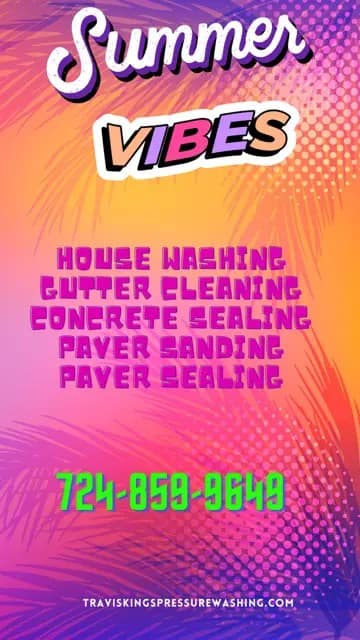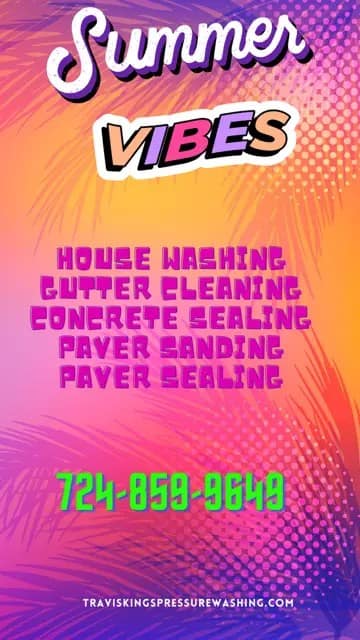
Introduction
Soft washing, a popular method for cleaning exterior surfaces, relies on various factors to achieve optimal results. One critical component in this process is sodium hypochlorite, a key ingredient in many cleaning solutions. But at what temperature does sodium hypochlorite work best for soft washing? In this article, we’ll delve into the science behind sodium hypochlorite and explore the ideal temperature conditions for its efficacy in soft washing.
Understanding Sodium Hypochlorite
Composition and Properties
Sodium hypochlorite is a chemical compound consisting of sodium, oxygen, and chlorine (NaOCl). It’s commonly used as a disinfectant, bleaching agent, and cleaning agent due to its powerful oxidizing properties.
Applications in Soft Washing
In soft washing, sodium hypochlorite serves as the primary agent for breaking down dirt, grime, mold, and mildew on various surfaces, including roofs, siding, and decks. Its ability to kill bacteria and algae makes it a preferred choice for exterior cleaning.
Factors Affecting Sodium Hypochlorite’s Effectiveness
Concentration of Sodium Hypochlorite
The concentration of sodium hypochlorite solution significantly impacts its cleaning power. Higher concentrations are more effective but require careful handling due to their corrosive nature.
Temperature Considerations For House Washing
Temperature plays a crucial role in determining the efficacy of sodium hypochlorite. Warmer temperatures generally enhance its activity, accelerating the cleaning process.
pH Levels
Maintaining the appropriate pH levels is essential for maximizing the effectiveness of sodium hypochlorite. Solutions with higher pH levels tend to work more efficiently.
Optimal Temperature for Soft Washing
Impact of Temperature on Sodium Hypochlorite Activity
Temperature directly influences the rate of chemical reactions involving sodium hypochlorite. Warmer temperatures increase molecular motion, resulting in faster reaction rates and more effective cleaning.
Recommended Temperature Ranges
For optimal results, soft washing experts recommend operating within specific temperature ranges. Typically, temperatures between 70°F and 90°F (21°C and 32°C) are considered ideal for sodium hypochlorite-based solutions.
Benefits of Using the Right Temperature
Maintaining the proper temperature during soft washing offers several benefits:
Enhanced Cleaning Efficiency: Optimal temperatures ensure that sodium hypochlorite works at maximum effectiveness, leading to better cleaning outcomes.
Reduced Dwell Time: Warmer temperatures help expedite the cleaning process, minimizing the time required for solution application and rinsing.
Consistent Results: By adhering to recommended temperature ranges, soft washing professionals can achieve consistent and predictable cleaning results across different surfaces and conditions.
Tips for Achieving Ideal Temperature
Monitoring and Adjusting
Utilize temperature gauges to monitor the ambient temperature during soft washing operations. Adjust application schedules accordingly to coincide with the optimal temperature range for sodium hypochlorite.
Safety Precautions
Exercise caution when working with sodium hypochlorite solutions, especially at higher temperatures. Wear appropriate personal protective equipment (PPE) and follow recommended safety guidelines to prevent accidents or chemical exposure.
Conclusion
In conclusion, the temperature at which sodium hypochlorite operates best for soft washing falls within the range of 70°F to 90°F (21°C to 32°C). By understanding the relationship between temperature and sodium hypochlorite efficacy, practitioners can achieve superior cleaning results while maintaining safety standards.
FAQs
1. What is the ideal temperature for sodium hypochlorite in soft washing?
The ideal temperature range for sodium hypochlorite in soft washing is typically between 70°F and 90°F (21°C and 32°C).
2. How does temperature affect sodium hypochlorite’s effectiveness?
Warmer temperatures accelerate chemical reactions, increasing the activity and effectiveness of sodium hypochlorite in soft washing solutions.
3. Can sodium hypochlorite be used in cold weather?
While sodium hypochlorite can still be effective in colder temperatures, its activity may be slower compared to warmer conditions. Adjustments in application techniques may be necessary.
4. Is it safe to heat sodium hypochlorite?
Heating sodium hypochlorite can enhance its effectiveness but requires caution due to the risk of generating harmful chlorine gas. It’s essential to follow proper safety protocols when heating sodium hypochlorite solutions.
5. What are alternative methods if optimal temperature isn’t achievable?
If operating within the recommended temperature range isn’t feasible, consider adjusting application techniques or using supplementary cleaning agents to achieve desired results in soft washing.
Why Use Sodium Hypochlorite to Soft Wash or House Wash Near Pittsburgh, PA
Soft washing or house washing is an essential aspect of home maintenance, especially in areas like Pittsburgh, PA, Coordinates:  40°26′23″N 79°58′35″W, where weather conditions can lead to the buildup of grime, mold, and mildew on exterior surfaces. When it comes to effectively cleaning these surfaces, sodium hypochlorite emerges as a hero. But why exactly should you opt for sodium hypochlorite to soft wash or house wash near Pittsburgh, PA? Let’s delve into the reasons behind this choice.
40°26′23″N 79°58′35″W, where weather conditions can lead to the buildup of grime, mold, and mildew on exterior surfaces. When it comes to effectively cleaning these surfaces, sodium hypochlorite emerges as a hero. But why exactly should you opt for sodium hypochlorite to soft wash or house wash near Pittsburgh, PA? Let’s delve into the reasons behind this choice.
Introduction
Picture this: after a long winter, your home’s siding and exterior surfaces are coated with layers of dirt, mold, and algae. Not only does it look unsightly, but it can also lead to structural damage if left unaddressed. This is where soft washing comes into play – a gentle yet highly effective method of cleaning exterior surfaces. And at the heart of soft washing lies sodium hypochlorite, a powerful cleaning agent that can tackle even the toughest stains with ease.
What is Sodium Hypochlorite?
Sodium hypochlorite, commonly known as bleach, is a chemical compound consisting of sodium, oxygen, and chlorine. It is widely used as a disinfectant, sanitizer, and bleaching agent due to its ability to break down organic matter and kill bacteria, viruses, and fungi. In the context of soft washing, sodium hypochlorite serves as the primary active ingredient in cleaning solutions, effectively removing stains, mold, and mildew from various surfaces.
Advantages of Soft Washing
Before diving into the specifics of sodium hypochlorite, let’s first understand why soft washing is preferred over traditional pressure washing. Unlike pressure washing, which uses high-pressure water to blast away dirt and grime, soft washing relies on gentle, low-pressure techniques combined with specialized cleaning solutions. This approach not only ensures thorough cleaning but also minimizes the risk of damage to delicate surfaces such as vinyl siding, stucco, and painted wood.
The Role of Sodium Hypochlorite in Soft Washing
Now, you might be wondering, why sodium hypochlorite specifically? The answer lies in its potent cleaning properties. Sodium hypochlorite works by breaking down the molecular structure of organic stains, making them easier to rinse away. Additionally, it has excellent disinfectant properties, making it effective against mold, mildew, algae, and bacteria – common culprits in exterior surface discoloration. If you are looking for pressure washing services near Pittsburgh PA. Please feel free to reach out.
Safety Precautions
While sodium hypochlorite is a highly effective cleaning agent, it’s essential to handle it with care. When using sodium hypochlorite for soft washing, always wear protective gear such as gloves, goggles, and a respirator to avoid skin irritation, eye damage, and respiratory issues. Additionally, be mindful of nearby plants, pets, and water sources, as sodium hypochlorite can be harmful if ingested or if it comes into contact with vegetation.
Choosing the Right Sodium Hypochlorite Solution
Not all sodium hypochlorite solutions are created equal. When selecting a cleaning solution for soft washing, opt for a concentration specifically formulated for exterior use. Typically, solutions with a concentration of 3-6% sodium hypochlorite are suitable for most applications. However, for tougher stains or heavily soiled surfaces, higher concentrations may be necessary, albeit with added caution to prevent damage.
Application Techniques
The key to successful soft washing lies in proper application techniques. Whether using a pump sprayer, low-pressure sprayer, or soft washing system, ensure thorough coverage of the affected surfaces without oversaturating them. Start from the bottom and work your way up to prevent streaking, and allow the cleaning solution to dwell for the recommended time before rinsing it off gently with water.
Environmental Considerations
While sodium hypochlorite is effective in cleaning exterior surfaces, its use raises valid environmental concerns. To minimize environmental impact, opt for biodegradable cleaning solutions that are safe for aquatic life and vegetation. Additionally, consider using containment measures to prevent runoff into storm drains or waterways, and always follow local regulations regarding the use and disposal of cleaning chemicals.
Cost-Effectiveness
Despite its efficacy, sodium hypochlorite remains a cost-effective solution for soft washing compared to alternative methods. Its relatively low cost per gallon makes it an attractive option for homeowners and professionals alike, providing excellent value for money without compromising on cleaning performance.
Common Misconceptions
There are several misconceptions surrounding the use of sodium hypochlorite in soft washing, with safety and environmental concerns being among the most prevalent. However, when handled and used properly, sodium hypochlorite can be a safe and eco-friendly choice for exterior cleaning, delivering exceptional results without harm to people or the environment.
Local Regulations in Pittsburgh, PA
Before embarking on any soft washing project near Pittsburgh, PA, it’s crucial to familiarize yourself with local regulations and restrictions regarding the use of cleaning chemicals, particularly in residential areas. Be sure to comply with any permits, guidelines, or limitations set forth by municipal authorities to avoid potential fines or penalties.
Case Studies and Testimonials
Still not convinced of the effectiveness of sodium hypochlorite for soft washing? Consider these real-world examples of successful soft washing projects in the Pittsburgh area. From revitalizing weather-beaten siding to restoring the luster of outdoor surfaces, sodium hypochlorite has proven time and again to be a reliable ally in the battle against dirt, grime, and discoloration.
Conclusion
In conclusion, sodium hypochlorite offers a safe, effective, and economical solution for soft washing and house washing near Pittsburgh, PA. Its powerful cleaning properties, combined with proper application techniques and safety precautions, make it the ideal choice for tackling tough
stains, mold, and mildew on exterior surfaces. By harnessing the power of sodium hypochlorite, you can restore the beauty and integrity of your home’s exterior with confidence.
FAQs
Is sodium hypochlorite safe for use on all surfaces?
- While sodium hypochlorite is generally safe for use on most exterior surfaces, it’s essential to test it in an inconspicuous area first to ensure compatibility and prevent damage.
Can I mix sodium hypochlorite with other cleaning agents?
- It’s not recommended to mix sodium hypochlorite with other cleaning agents, as this can result in hazardous chemical reactions. Stick to using it as directed for best results.
How often should I soft wash my home’s exterior?
- The frequency of soft washing depends on various factors such as climate, location, and the level of environmental exposure. As a general rule, aim for annual or bi-annual cleanings to maintain optimal cleanliness and appearance.
Will soft washing with sodium hypochlorite harm my plants or landscaping?
- While sodium hypochlorite can be harmful to plants if not used properly, taking precautions such as pre-soaking vegetation and rinsing thoroughly can help minimize the risk of damage.
Is soft washing with sodium hypochlorite suitable for all climates?
- Yes, soft washing with sodium hypochlorite is suitable for all climates, including areas with high humidity or frequent rainfall. Its effectiveness in combating mold and mildew makes it a versatile solution for various environmental conditions.

